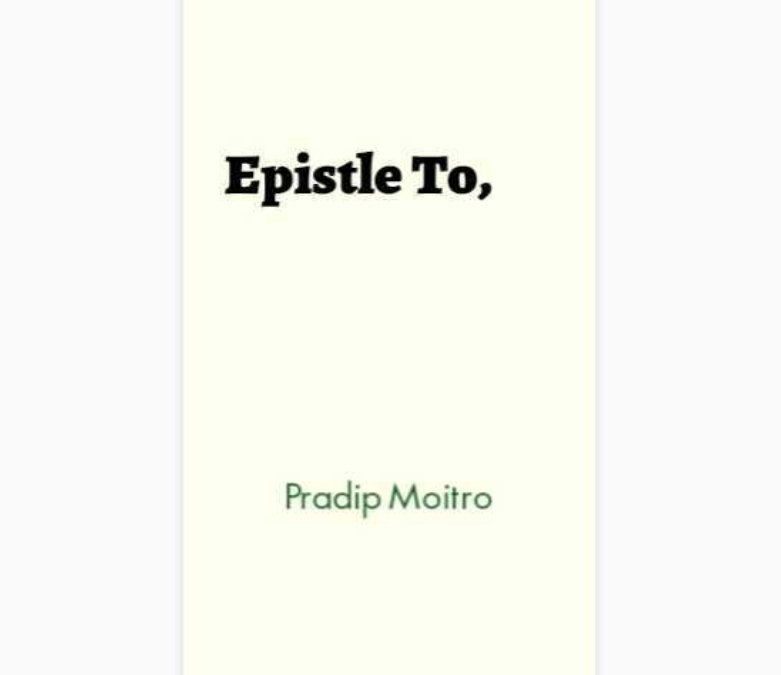(Continued … Part 3)
Epistle to ..
(Musings of a Stephanian)
Despite the legacy of death – the sense of loss and the consuming emptiness that never ceased to gnaw at my vitals – I felt blessed and ennobled. At moments I felt resurrected by something I never had: the reassuring and uplifting embrace of a father who was no more.
But the girl who brought into my life this feeling of bounty and satisfied self-completeness pulled the plug on me just as suddenly as she had switched on the light. Her abrupt and causeless termination of writing plunged me into an unrelieved pit of despair. I lost my customary zest for life; I developed a nihilistic attitude towards everything and everybody. Rightly or wrongly, I felt like a sparrow paralysed under the glazed gaze of a boa constrictor. I entered the examination hall as one sleep-walking; the heart has gone out of my all endeavour. Her behaviour robbed me – temporarily – of my one strength – academic supremacy. The last letter I wrote to her was brief, only one line: “It were better not to have come than to have left me alone in the loneliness of the late spring afternoon.
It took me full five years to extricate myself out of this quicksand. Then I discovered that cure for the lost love is new love. This new love was Sandy who combined uncommon beauty of architecture with a heightened intellectual acumen. She shared my interest in history and culture of Latin America.
I was the lucky dog to win the most prestigious Fellowship of the university. This feat turned me into an American version of a Turkish Sultan, with a harem of his own. Since my subject in England was Greek, Latin and Sanskrit – a highly unusual combination – and I was the top dog, the most talented and beautiful girls of the campus danced attention on me. I was the chosen one. But I was not a chair-bound dehydrated intellectual. My taste was simple: I wanted and got nothing but the best of everything. And that included girls on a galactic scale.
Together, Sandy and I knocked about America and Europe like a pair of Wandering Jews. Sandy came from a wealthy Jewish family of New York. I had talked to her about how Francisco de Orellana in 1542 became the first European to navigate the Amazon from its headwaters in Coca, Peru to its mouth in Atlantic. I wanted to trace Orellana’s route.
But I settled for less. During one summer break, Sandy and I boarded a Greek freighter from Manaus, a Brazilian city on Amazon. In the tropical lush wilderness it stands as an improbable city, dropped from heaven as it were.
Manaus is a city sprouted out of the jungle by the rubber barons in the nineteenth century. In its heyday, it rivalled any fashionable city in Europe. Eager not to be regarded as colonial, the rubber barons created a fantasy land – even its architecture was imported from Europe. They spared no expenses to bring the finest and latest of European troupes to perform in the sumptuous halls of Manaus. Women carried themselves with an air of the shimmering flirtatiousness for which every European girl of pedigree was justly famous. When a European opera was in town, the Manaus evening air was cloyingly sensuous with the seductive scents that its beautiful and well-designed women wore. In Europe, such perfumes were the luxury of the most privileged of women. The Spanish or a Portuguese girl is a born flirt: she flirts with murderous innocence. The scent she wears is like the scent of a tigress; a tigress marks her territory with her scent. The Spanish or Portuguese girl, too, leaves her scent on the man of her interest, warning, in the manner of the tigress, all trace passers on what she has designated as her sacrosanct domain.
( *To be continued…)*
About the author
Pradip Moitro (1939 – 2012) was born in undivided India, in today’s Bangladesh. Post partition, the family migrated to West Bengal, where he completed his schooling at Barrackpore, a Calcutta suburb. Then he joined St. Stephens, Delhi and after that had moved to Oxford.Later he rose to become an in -house polymath of White House and became a speech writer of an US President in the last quarter of 20th century. He breathed his last at Oxford.

